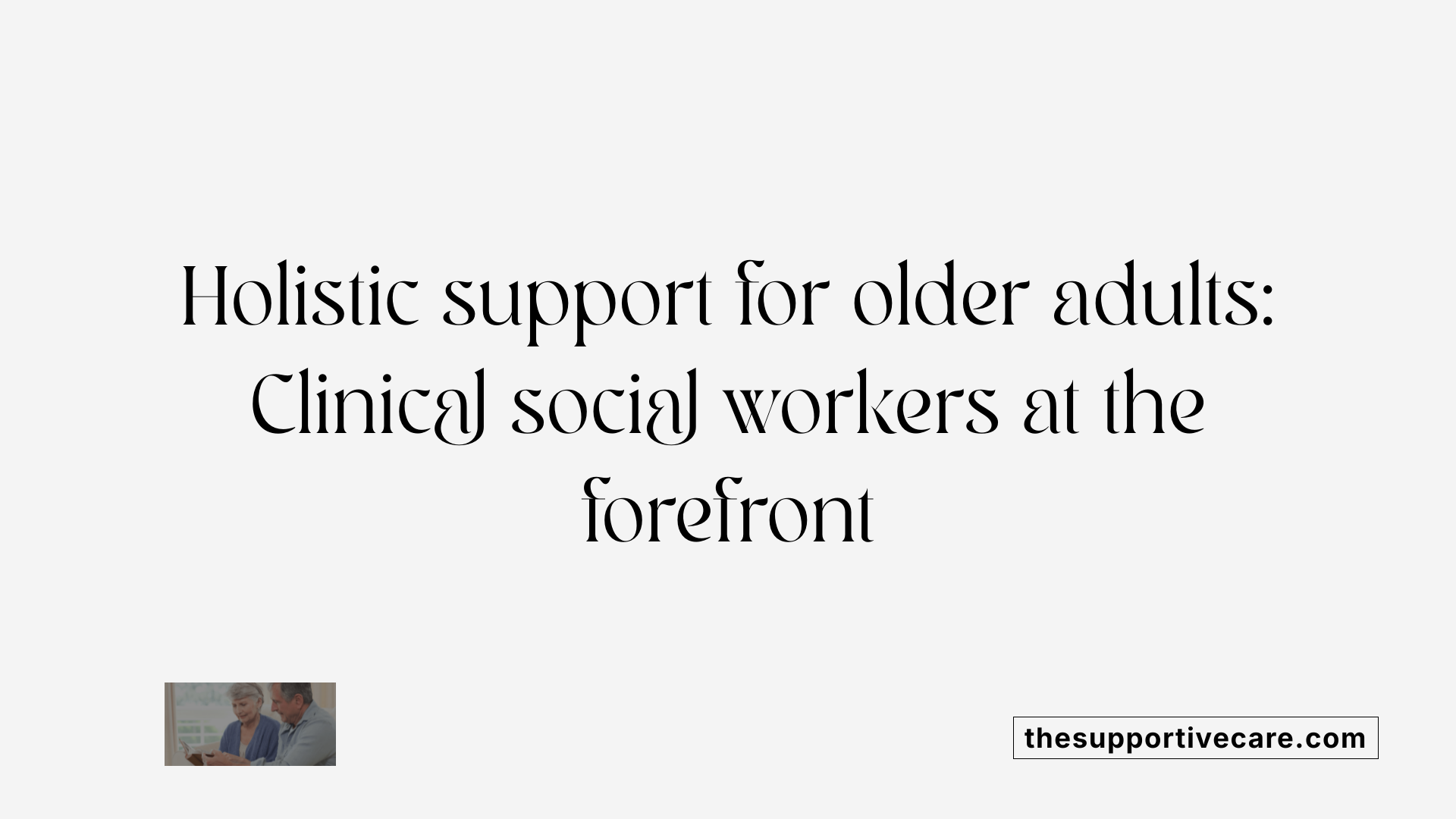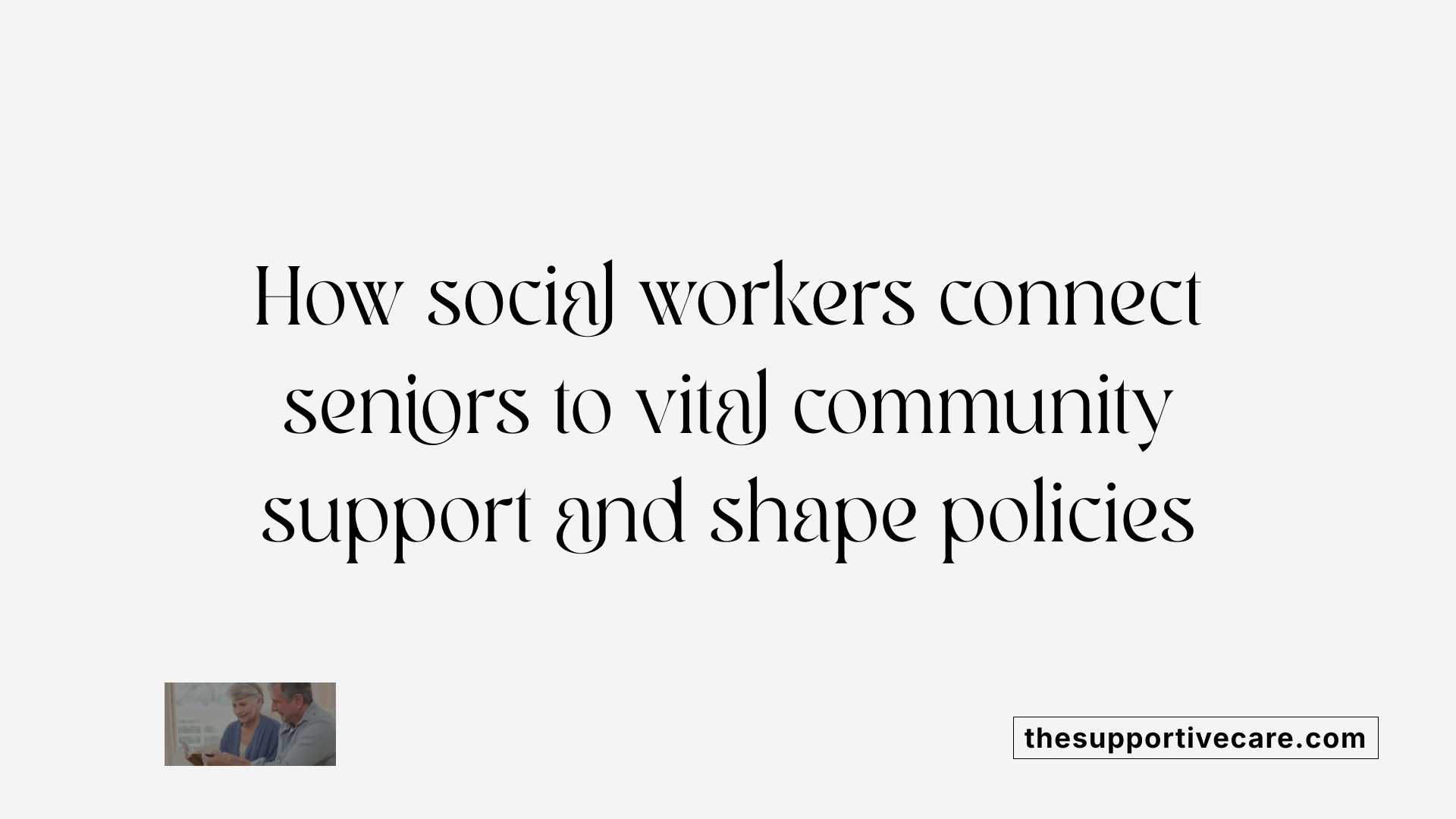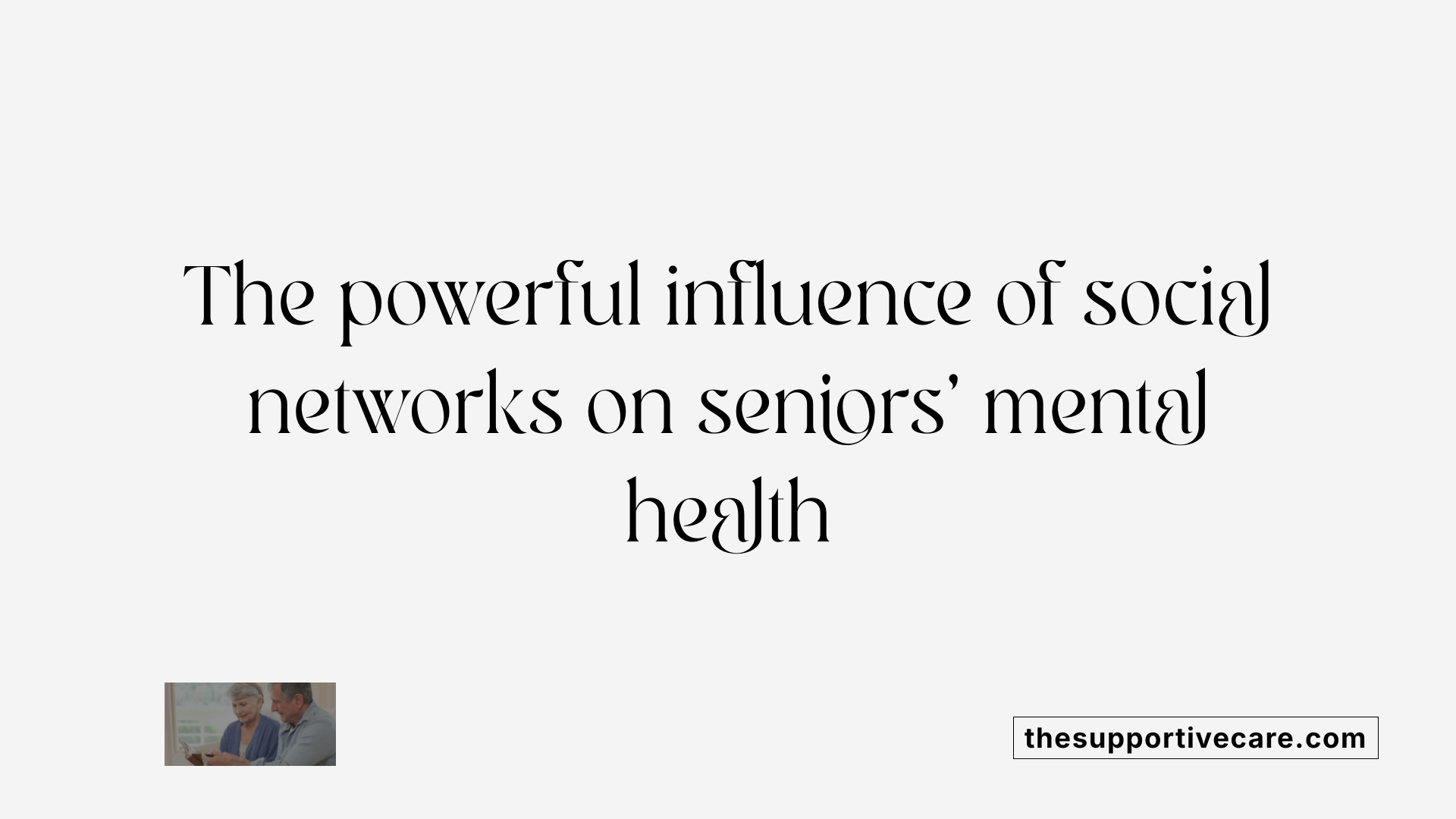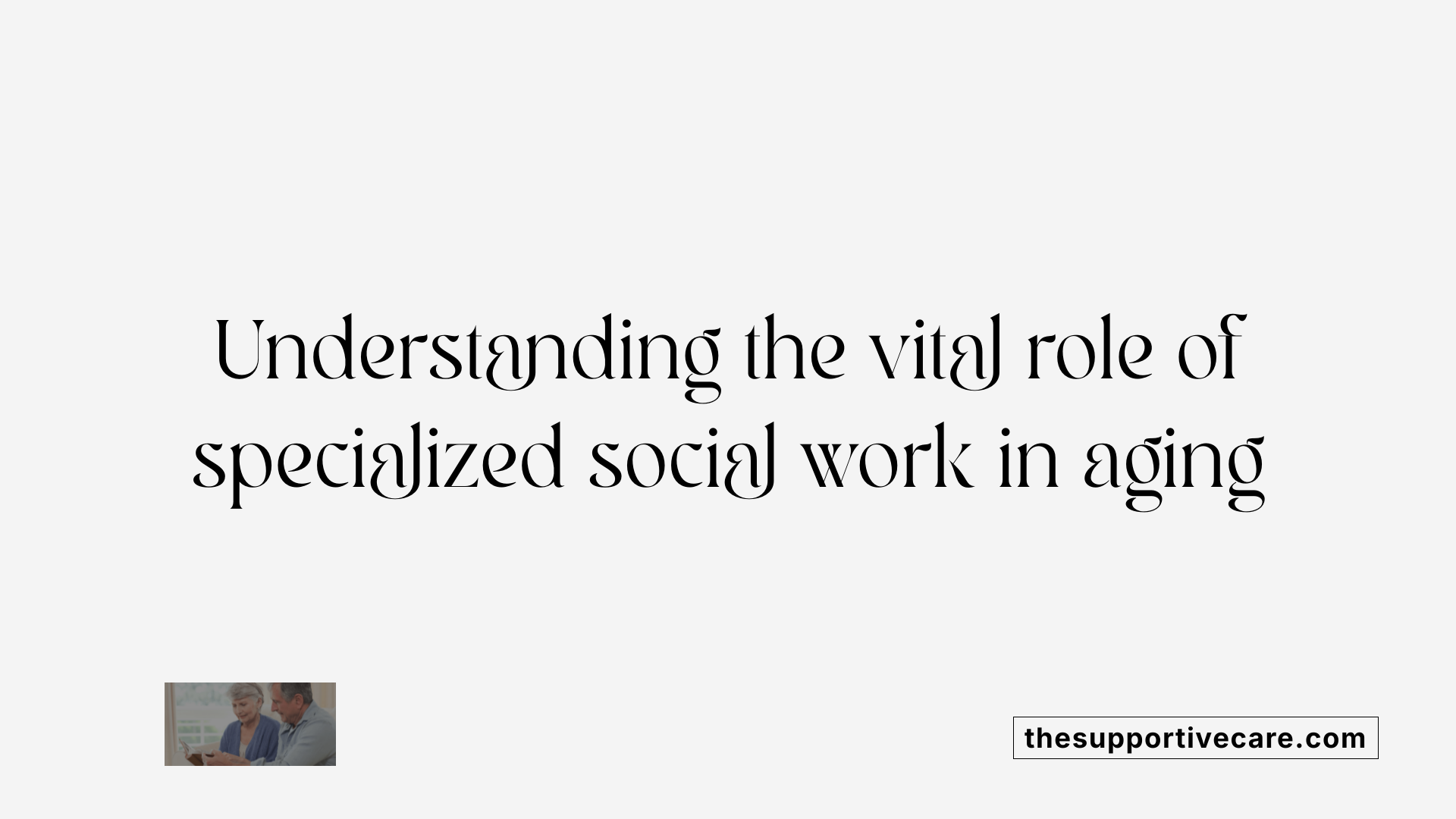The Integral Role of Social Support in Elderly Well-Being
As the aging population grows worldwide, the importance of supporting emotional and mental health among older adults becomes increasingly vital. Clinical social workers stand at the forefront of this effort, employing a diverse range of methods and interventions to promote dignity, independence, and resilience among seniors. This article explores how these dedicated professionals contribute significantly to enhancing the emotional well-being of elderly patients across different settings, emphasizing the need for specialized skills, community engagement, and advocacy.
The Role of Clinical Social Workers in Elderly Care

What is the role of clinical social workers in supporting the emotional well-being of elderly patients?
Clinical social workers are essential in ensuring the psychological and emotional health of older adults. They conduct psychosocial assessments to identify mental health issues such as depression, anxiety, grief, and social isolation. Using therapeutic techniques like counseling and motivational interviewing, they help seniors cope with emotional challenges that arise from aging, illness, or loss.
Beyond direct mental health support, they serve as advocates, guiding older adults and their families through complex healthcare and social systems. They assist with accessing community services, including meal programs, transportation, and legal support, making sure seniors receive comprehensive care tailored to their needs.
Support extends to caregivers too. Social workers provide guidance and respite options to prevent caregiver burnout, ensuring that families can sustain their support roles. They also facilitate meaningful social engagement by organizing community activities and fostering connections, which significantly boosts seniors’ sense of belonging and purpose.
An important part of their role is end-of-life planning and grief counseling. They help seniors and families navigate sensitive decisions about advanced directives, hospice care, and funeral arrangements. Their emotional support helps clients face these stages with dignity, reducing anxiety and facilitating acceptance.
In summary, clinical social workers wrap a multifaceted support system around elderly individuals, addressing their emotional, social, and practical needs. Their work enhances quality of life, promotes independence, and preserves the dignity of older adults, making a profound difference in the aging journey.
| Aspect | Description | Additional Notes |
|---|---|---|
| Counseling | Offers therapy for depression, grief, loneliness | Uses evidence-based techniques like CBT and mindfulness |
| Advocacy | Navigates healthcare, legal, and social resources | Ensures rights are protected and needs met |
| Family Support | Guides families, offers respite, caregiver training | Supports the caregiver and the elderly |
| End-of-life Planning | Facilitates decision-making, grief support | Emphasizes dignity and informed choices |
| Community Engagement | Organizes social activities, combats loneliness | Promotes social inclusion |
| Assessment Domains | Evaluates mental health, social support, physical health | Guides personalized care and interventions |
Through these services, clinical social workers significantly contribute to a holistic approach in elderly care, emphasizing emotional stability and societal integration.
Methods and Interventions to Foster Emotional Health

What methods and interventions do social workers use to enhance emotional health in seniors?
Social workers employ a broad range of strategies to improve the emotional well-being of older adults. One fundamental approach is providing individual counseling and support groups that give seniors safe spaces to express feelings and share experiences. These therapies help address depression, grief, and anxiety, common emotional challenges faced by many seniors.
Evidence-based psychotherapies such as cognitive behavioral therapy (CBT) are frequently utilized, offering seniors tools to modify negative thought patterns and develop healthier coping mechanisms. Social workers also incorporate social skills training, including programs like Cognitive Behavioral Social Skills Training (CBSST), to improve social functioning and reduce feelings of loneliness.
Community programs play a vital role in promoting social engagement. Social workers connect seniors to local social clubs, activity centers, and community events, which foster interaction and counteract social isolation. Behavioral interventions like FAST (Falls and Balance Training) and PEDAL (Physical Exercise for Daily Living) help seniors maintain independence in daily activities, thus positively impacting their emotional health.
Through multidisciplinary care coordination, social workers advocate for integrated support that combines mental health services with general medical care. Models like Assertive Community Treatment (ACT) exemplify team-based approaches that deliver comprehensive, personalized support addressing biological, psychological, and social needs.
Protecting seniors from ageism, abuse, and neglect is another critical intervention. Psychoeducation programs inform both seniors and caregivers of rights and available services. Caregiver support initiatives reduce stress and burnout among those providing care.
Overall, these methods work cohesively to support seniors’ mental health, foster resilience, and enhance their overall quality of life.
Skills and Training for Geriatric Social Workers

What skills and training are necessary for social workers practicing in geriatric care?
Geriatric social workers need a blend of formal education, specialized training, and ongoing professional development to effectively serve older adults. The journey typically begins with earning a Bachelor of Social Work (BSW) or a Master of Social Work (MSW). An MSW with a focus on aging provides advanced coursework and practical experiences tailored to elder care.
Core competencies include understanding elder abuse, performing mental health assessments specific to seniors, and advocating for clients. Cultural competence is also critical, recognizing the diverse backgrounds seniors may come from. Additionally, geriatric social workers must excel at collaboration, working with healthcare providers, caregivers, and community organizations across various settings such as hospitals, nursing homes, and community centers.
Certifications like the NASW’s Social Worker in Gerontology (SWG) and Advanced Social Worker in Gerontology (ASW-G) verify specialized skills and knowledge. These credentials often require fulfilling additional training hours and passing exams.
To keep pace with developments in elder care, social workers are encouraged to pursue continual education. Workshops, seminars, and courses on legal issues, new treatment approaches, and emerging resources ensure that practice remains current. This ongoing learning empowers social workers to provide informed, compassionate, and effective support tailored to the needs of aging populations.
By developing these skills and acquiring relevant certifications, geriatric social workers can better navigate complex cases, address emotional and psychological challenges, and advocate for policies that benefit seniors and their families.
| Training Aspect | Description | Additional Notes |
|---|---|---|
| Formal Education | BSW or MSW, with a focus on aging or gerontology | MSW programs often include specialized coursework |
| Certifications | NASW SWG, ASW-G | Demonstrates advanced expertise |
| Core Skills | Assessment, advocacy, cultural competence, interdisciplinary collaboration | Essential for comprehensive elder support |
| Continuing Education | Workshops, online courses, conferences | Keeps up with legal, medical, and social innovations |
| Ethical Practice | Confidentiality, autonomy, respecting diversity | Fundamental for trustworthy care |
Remaining committed to education and skill enhancement ensures social workers can meet the unique challenges of aging populations, improve quality of life for seniors, and promote dignity in elder care.
Community Resources, Advocacy, and Policy Impact

How do social workers advocate and connect elderly patients with community resources to improve their emotional well-being?
Social workers play a critical role in improving the emotional well-being of older adults by actively connecting them to vital community resources. They begin with comprehensive assessments of the seniors’ mental health, social support, and daily living needs. This helps identify areas where additional support can make a difference.
Once needs are identified, social workers facilitate access to a wide range of community services such as mental health counseling, social clubs, transportation aid, meal delivery programs, and support groups. They use guidelines and tools from organizations like the Substance Abuse and Mental Health Services Administration (SAMHSA) to develop tailored interventions. These resources help reduce social isolation and provide psychological support.
Advocacy is also a significant part of their work. Social workers push for policy changes that expand access to mental health and social services. They work to enhance caregiver education and promote community outreach initiatives designed specifically for seniors.
In healthcare settings, social workers coordinate with primary care providers to facilitate behavioral health treatment plans aimed at preventing or managing depression, anxiety, and other mental health issues.
Moreover, they are involved in crisis intervention, connecting seniors to urgent services like The 988 Lifeline, which offers immediate mental health support. By streamlining referrals and navigating complex healthcare systems, social workers empower older adults to maintain independence and resilience.
The integration of evidence-based practices ensures that interventions are effective and responsive to specific community needs. Overall, social workers serve as crucial links between elderly individuals and the supportive resources that help foster emotional stability and a better quality of life.
Impact of Social Support and Practice on Elderly Mental Health

What is the impact of social support and social work practices on the mental health of older adults?
Social support and dedicated social work practices are vital in promoting mental well-being among seniors. Research, including the China Longitudinal Aging Social Survey (CLASS), confirms that both formal and informal networks help reduce issues like loneliness, depression, and anxiety.
Formal support from social workers often involves emotional counseling, mental health assessments, and connecting seniors to community resources, while informal support stems from family, friends, and community groups. When these sources of support are available and active, older adults experience higher levels of life satisfaction and better access to healthcare services.
Engaging in social activities and providing support to others can also elevate seniors' self-esteem and sense of purpose. This active participation bolsters their psychological resilience, making them feel more useful and independent.
Research shows differences among groups. Benefits are especially notable for younger seniors, those not engaged in traditional agricultural work, and residents in supportive neighborhood environments. These groups tend to have better mental health outcomes when their social needs are met.
Incorporating strategies that enhance social support throughout the lifespan, such as community programs, volunteering, and peer support, can greatly improve emotional health. Overall, fostering rich social interactions and support networks helps seniors maintain a positive outlook and cope better with life's challenges.
| Aspect | Influence on Mental Health | Additional Notes |
|---|---|---|
| Formal social work practices | Reduce loneliness, depression, anxiety | Counseling, resources coordination |
| Informal community support | Enhance social participation, life satisfaction | Family, friends, community groups |
| Psychological resilience factors | Increase independence, self-esteem | Active engagement, volunteering |
| Demographic variations | Younger, non-agricultural seniors see more benefit | Support tailored based on age and lifestyle |
| Neighborhood environment | Supportive environments boost outcomes | Community cohesion and safety important |
By understanding these dynamics, social workers and community organizations can design interventions that foster stronger social bonds, improve mental health, and promote active aging.
The Significance of Gerontological Social Work in Elder Care

What is gerontological social work and why is it important in elder care?
Gerontological social work is a specialized branch of social work dedicated to addressing the unique needs of older adults. These professionals focus on enhancing the well-being, independence, and quality of life for seniors through comprehensive assessments, personalized support, and advocacy.
Geriatric social workers operate across various settings, including hospitals, community centers, long-term care facilities, and legal systems. They assist with navigating complex healthcare procedures, securing financial resources such as Medicare and Medicaid, and protecting against elder abuse and neglect.
A central goal of gerontological social work is to promote person-centered, respectful care. This involves understanding each individual's personal history, health conditions, and social circumstances to tailor interventions effectively. For example, they help with end-of-life planning, mental health support, and connecting seniors to community resources like meal services, transportation, and social clubs.
These professionals also work to reduce social isolation by organizing activities that foster social interaction and community engagement. They support family caregivers, helping prevent burnout and providing practical advice for in-home care.
By addressing both physical health and emotional well-being, gerontological social workers play a vital role in ensuring that older adults live with dignity, independence, and a sense of purpose. Their efforts are crucial in creating an inclusive, supportive environment where aging individuals can thrive.
| Role | Setting | Focus Area | Additional Details |
|---|---|---|---|
| Care Coordination | Hospitals, clinics, home care | Health management, transition planning | Organize healthcare services and facilitate smooth transitions between care settings |
| Advocacy | Legal, community groups | Rights protection, policy influence | Develop advocacy initiatives to promote seniors' rights and policy changes |
| Emotional Support | Community programs, residential care | Mental health, grief counseling | Provide therapy, support groups, and emotional resilience training |
| Needs Assessment | All settings | Holistic evaluation | Use evidence-based tools to assess physical, emotional, and social needs |
| Resource Linkage | Community centers, government programs | Social services, social participation | Connect seniors to meal services, transportation, social groups |
By combining these efforts, gerontological social work offers a comprehensive approach that respects the complexities of aging while empowering seniors to live meaningful lives.
Empowering Seniors for a Better Quality of Life
In conclusion, clinical social workers form a vital part of the elder care landscape, employing tailored interventions, rigorous assessments, and sustained advocacy to support the emotional health and overall well-being of older adults. Their expertise in navigating healthcare systems, connecting seniors to community resources, and providing psychosocial support ensures that aging individuals can maintain independence, dignity, and a high quality of life. As the demographic shift accelerates, the role of gerontological social work becomes ever more critical, emphasizing the importance of continuous professional development, community engagement, and policy advocacy to shape a supportive environment for our aging populations. By fostering resilience and social connectedness, social workers help seniors not just age in place, but thrive.
References
- The Crucial Role of Social Workers in Helping Senior ...
- Supporting Older Adults as a Gerontology Social Worker
- Empowering Older Adults as a Licensed Clinical Social ...
- A Guide to Social Work with Older Adults
- Factors influencing emotional support of older adults living ...
- How Geriatric Social Workers Are Transforming Senior Care
- Empowering Aging Adults: How Social Workers Enhance ...
- How Can a Medical Social Worker Help an Aging Parent?


































































































